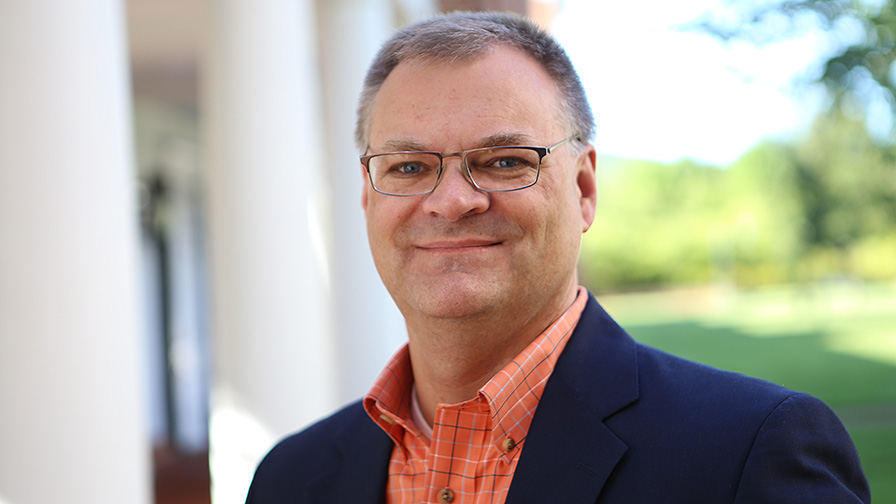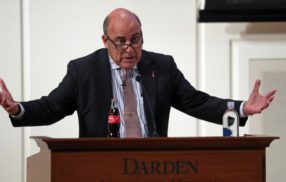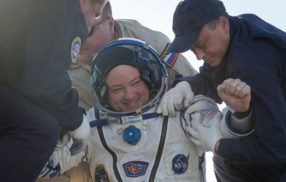
Q&A: How UVA Darden Plans to Become ‘the Best in the World’ at Experiential Leadership Development
In May, the University of Virginia Darden School of Business announced plans for the Initiative for Transformational Leadership and Learning, a multidisciplinary effort to develop a learning laboratory devoted to novel, scientifically verified leadership development. The initiative launched with $2 million in seed funding, including a $1 million gift from Abundant Power Group CEO Shannon Smith (MBA ’90), a $500,000 match to Smith’s gift from the UVA Bicentennial Professors Fund and $500,000 from the Jakarta-based Rainbow Foundation.
Darden Professors Jim Detert and Bobby Parmar will lead the formation and growth of the initiative. Detert — recently named Darden’s associate dean for executive degree programs and leadership initiatives — spoke about the goals of the initiative and the role philanthropy will play to drive it forward.
Can you describe the Initiative for Transformational Leadership and Learning?
At the broadest level, the objective is to create transformational learning experiences for students, in particular, experiences focused on development of specific leadership capabilities.
That, of course, requires you do things on several fronts. You have to create new knowledge about what great leadership actually looks like, how it develops, and how it functions. You have to create great curriculum and coursework that helps people develop the knowledge component of what we know about leadership.
Then you have to build and deliver nonclassroom, experiential leadership development activities. Some people have suggested that over half of true leadership development comes from the practice of leading itself. That is clearly distinct from acquiring knowledge or anything else we typically do in the classroom. So, what we are aiming to do here is to become the best in the world at providing and carefully assessing the value of the “doing” part of leadership development.
That would include putting students into actual leadership roles while they are here, and it would include crafting external experiences outside of Darden where they develop their social, emotional and cultural intelligence skills, and use them to help institutions outside of Darden. It also includes what is a core focus for us right now, which is building experiential leadership labs where we put people in highly stressful, highly emotionally-charged, emotionally ambiguous experiences and we track responses very carefully, not just with more typical audio visual technologies but also by capturing a set of physiological markers (like heart rate and galvanic skin response). Professor Bobby Parmar is doing a wonderful job leading this component of the overall initiative.
Does this feel like a void in the graduate business school area?
There is no question it is a void. Business schools have undertaken a variety of initiatives to try to provide people some experiential practice. A reasonable number of schools today have some sort of coaching. But a much more limited number of schools have put it together in a true iterative learning cycle of: Try doing something, then reflect with the aid of a coach and evidence about how one did, then learn relevant skills, then try again.
What has been the role of philanthropy in getting the initiative off the ground?
The reality of true human development of the type we are talking — socio-, emotional, interpersonal development — is it is very personalized and hence costly. I can’t help you have multiple, guided high-stress practice experiences in a class of 59 other students. So philanthropy allows us to have the resources required for individual development.
In the lab, it allows us to have the personnel needed to develop and facilitate the technology-aided, high-stress learning experiences. It allows us to hire the coaches, actors and researchers needed to create and deliverer these tailored experiences for each student. That’s a much more expensive proposition than one instructor hired to lead a class of 60.
Right now, we have the capacity to run the initial trials and some small-scale courses to demonstrate the potential of this approach. To begin to think about scaling it to the entire cohorts of full-time and Executive MBA students and participants in some executive education programs requires an entirely different resource base. We also need additional philanthropy to carefully study, document and disseminate insights emerging from what we are doing. Our goal is not just to create these kinds of transformational experiences here at Darden, but also to be seen as thought leaders around the world for this kind of work.
Does Darden feel like a uniquely appropriate place to lead this sort of work?
At a personal level and at the School level, the answer is clear: Yes.
I left a tenured role at Cornell to come here specifically because I knew Darden’s mission was to develop leaders. This place lives and breathes the notion of developing principled leaders who make a positive impact throughout their lives. So for me, absolutely, it feels like the right place to be to do something bold like this.
The University of Virginia Darden School of Business prepares responsible global leaders through unparalleled transformational learning experiences. Darden’s graduate degree programs (MBA, MSBA and Ph.D.) and Executive Education & Lifelong Learning programs offered by the Darden School Foundation set the stage for a lifetime of career advancement and impact. Darden’s top-ranked faculty, renowned for teaching excellence, inspires and shapes modern business leadership worldwide through research, thought leadership and business publishing. Darden has Grounds in Charlottesville, Virginia, and the Washington, D.C., area and a global community that includes 18,000 alumni in 90 countries. Darden was established in 1955 at the University of Virginia, a top public university founded by Thomas Jefferson in 1819 in Charlottesville, Virginia.
Press Contact
Molly Mitchell
Associate Director of Content Marketing and Social Media
Darden School of Business
University of Virginia
MitchellM@darden.virginia.edu








